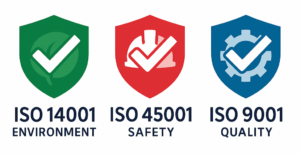After spending years working across multiple facets of the construction industry—from safety systems to business administration to software development—I’ve gained a unique perspective on the technological challenges facing this sector.
The Construction Technology Disconnect
Construction remains one of the least digitised industries globally, despite being one of the largest sectors of the economy. Having worked in safety operations, business systems administration, and now as a lead software developer, I’ve witnessed firsthand how understanding the industry’s specific pain points is crucial when developing effective software solutions.
Many construction companies find themselves drowning in administrative overhead—manual documentation, compliance reporting, resource allocation, and project management tasks that pull valuable time away from actual building work. The industry has become administratively heavy, with personnel spending more time on paperwork than on productivity.
Why Industry Experience Matters in Software Development
Software developers often create solutions based on theoretical understanding rather than practical experience. My journey through various construction departments has shown me that effective construction software must be built with deep industry knowledge:
- When I managed safety systems, I saw how difficult it was to maintain compliance while keeping projects moving efficiently
- As a business systems administrator, I witnessed how disconnected workflows created information silos
- Now as a lead developer, I integrate these insights into creating solutions that truly address industry challenges
Streamlining Through Technology
The construction industry desperately needs to lean on technology to streamline processes. However, generic software solutions often fall short. Having spent time in HSE administration, systems engineering, and business operations, I’ve learned that construction software must address specific challenges:
- Mobile accessibility for on-site workers
- Offline capabilities for remote locations
- Simple interfaces for users with varying technical abilities
- Integration with existing systems and regulatory requirements
- Real-time data synchronisation across project stakeholders
The Path Forward
The construction industry stands at a technological crossroads. With labour shortages, tight margins, and increasing regulatory requirements, digital transformation is no longer optional—it’s essential for survival.
As someone who has lived and breathed both construction operations and software development, I’m dedicated to creating solutions that genuinely reduce administrative burden rather than adding to it. By developing software that reflects the real workflows of construction professionals, we can help the industry build more efficiently, safely, and profitably.
The most successful construction technology doesn’t just digitise existing processes—it reimagines them for a more efficient future. And that requires developers who understand not just code, but concrete.













